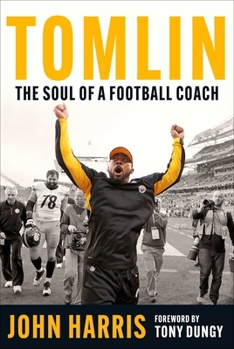Tomlin: The Soul of a Football Coach
In 2007, at the age of thirty-four, Mike Tomlin was hired as the head coach of the Pittsburgh Steelers. Replacing Hall of Famer Bill Cowher--and two years removed from the team's Super Bowl XL victory--there was immense pressure on the first-year head coach, who many fans and those in the media were largely unfamiliar with. After five seasons as an assistant for the Tampa Bay Buccaneers and a single season as the defensive coordinator for the Minnesota Vikings, the hiring came as a surprise to many. From his first day at the helm, numerous questions began to be asked: Was this young coach able to lead a veteran team that still had championship hopes? Could the newly hired, soft-spoken coach be able to fill the shoes of the great Cowher, known for being brash and outspoken? Was his hiring based solely on the "Rooney Rule"--named after Steelers owner Dan Rooney--which states that every team must interview at least one minority candidate for their open head coaching position? Not only did Tomlin rise above the questions and criticism about his credentials, he continued the franchise's reputation of excellence. The youngest coach to win a Super Bowl in only his second season at the helm, Tomlin has yet to have a losing record in sixteen seasons with the team. He is also the second-most tenured head coach in the league, only behind Bill Belichick of the New England Patriots. But the question still unanswered is, who is Mike Tomlin? Known for giving little to the media and keeping his thoughts and opinions private, those outside the locker room and Steelers offices know little about the future Hall of Fame coach. Even as one of the most successful African American head coaches in NFL history, and one that has handled numerous locker room "personalities" over the years, much of what is written and reported about the coach is only above the surface. That's where John Harris comes in. A veteran journalist who covered Tomlin's hiring for the Pittsburgh Tribune-Review, Harris works to pull back the curtain on the mystique behind this "coaching unicorn." Beginning with his days as a wide receiver at William & Mary, his several years in the college coaching ranks, to getting hired by Hall of Fame coach Tony Dungy with the Buccaneers and his single season with the Vikings, Tomlin shares how a young man from Hampton, Virginia, was able to establish himself as a leader of men in a business with so much turnover, earned the respect from his peers and players, and has continued to be someone that is looked up to by so many in the league. With interviews from former players, coaches, and executives, Harris lets readers in on what it's like to play for Tomlin, why he is (or is not) beloved in Pittsburgh, and how his continued success has helped change the landscape of what NFL franchises look for in hiring a head coach. All from a man that chooses to give all the success to his players and coaches--past and present--than take it for himself: exactly what every franchise hopes for from the leader of their team.
Format:Hardcover
Language:English
ISBN:1683584759
ISBN13:9781683584759
Release Date:November 2023
Publisher:Sports Publishing LLC
Length:480 Pages
Weight:1.65 lbs.
Dimensions:1.7" x 6.1" x 9.1"
Customer Reviews
1 rating
Don't waste your money !
Published by Kev , 1 year ago
I'm very disappointed with this book. It has very little to do with Tomlin or football. But if you want to learn about how racist the game of football is (not enough black coaches or GMs, etc.) or how the George Floyd was "murder" helped blacks gain professionally in the sport of football, then this is a book for you. It's mostly about how poorly blacks have been treated in society overall. And especially in the NFL. I couldn't even finish the last third of the book. What a joke.






